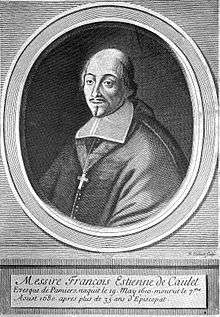François-Étienne Caulet
François-Étienne Caulet[1] (born at Toulouse, 1610; died at Pamiers, 1680) was a French bishop and Jansenist.[2]

Life
After completing his studies at the Collège of La Flèche he laboured for some time under Père de Condren, Superior of the French Oratory, and then joined Jean-Jacques Olier in founding the Vaugirard Seminary and the Company of Saint-Sulpice. When M. Olier accepted the parish of Saint-Sulpice (1642), Caulet became practically the head of the seminary.[3]
In 1644 Louis XIV, at the suggestion of St. Vincent de Paul, made him Bishop of Pamiers. Caulet had not sought episcopal honours, but once a bishop he showed great zeal in the reformation of the clergy, the annual visitation of the diocese, the holding of synods, and the founding of schools, one of which was devoted especially to the training of teachers. His impulsive zeal did not fail to raise opposition. The chapters of Foix and Pamiers, which he tried to reform, revolted openly, and had to be coerced into submission by Briefs of Pope Alexander VII and ordinances of Louis XIV.[4][5]
Two facts stand out prominently in Caulet's episcopal career, his attitude with regard to the formulary of Alexander VII[6] and his conduct in the affaire de la régale, i.e. the royal pretension to the revenues and the administration of vacant sees. On receipt of the formulary of Alexander VII Caulet issued a pastoral letter requesting his clergy to subscribe to it, but with certain qualifications (foi aux dogmes révélés, déférence respectueuse aux faits non révélés). Most people see in that respectful deference the silence respectueux of the Jansenists. However, De la Chambre (Traité du formulaire), Bouix (De Papâ, II, 95), and Bertrand (Histoire littéraire, III, 19) are of opinion that Caulet really meant an internal adhesion of the mind, albeit this adhesion may not have come up to the "ecclesiastical faith" as proposed by Fénelon, and later admitted commonly by theologians. Pope Clement IX did not urge the point, and accepted Caulet's adhesion such as it was.[3]
In February, 1673, Louis XIV, in need of funds, attempted to extend to all French bishoprics the droits de régale. Caulet was one of the few bishops who stoutly resisted the royal encroachment. Betrayed by his metropolitan, despoiled by the king, he appealed to Pope Innocent XI, who issued several Briefs, lauding his courage and his loyalty to the Church. The last of these Briefs, dated 17 July 1680 (Inn. XI, epistolae, Rome, 1890, I, 357), reached Pamiers just after Caulet's death, and it contained the best eulogy a bishop could receive.[3]
Caulet left a mass of episcopal ordinances, synodal statutes, memoirs, etc., analyzed by Doublet and Bertrand. Two treatises on the régale were published under his name in 1680 and 1681.[3]
References
- Also called M. De Foix from an abbey of which he was commendatory abbot.
- J.-M. Vidal, François-Étienne de Caulet, évêque de Pamiers (1610–1680) (Paris, 1939).
- Sollier 1913.
- Sollier 1913 states: For an account of his conflict with the Jesuits of Pamiers (1668) regarding approbation for hearing confessions, see Bertrand, "Hist. Litt. de la Compagnie de Saint-Sulpice" (Paris, 1900), III, 55,57.
- Sollier 1913 states: For the lengthy previous controversies see Lucius Ferraris (Roman ed., 1885) s.v. "Approbation"; Santi (ed. Leitner, Rome, 1905), "Praelectiones juris canonici", III, 366; Marie Dominique Bouix "De episcopo", II, 250, and "De jure regularium", II, 213 sqq.
- Sollier 1913 cites Denzinger, "Enchiridion", no. 971.
Bibliography
- Doublet, Georges (1895). Un prélat janséniste F. de Caulet: réformateur des chapitres de Foix et de Pamiers (in French). Foix: Foix-Gadrat Ainé.
Attribution
